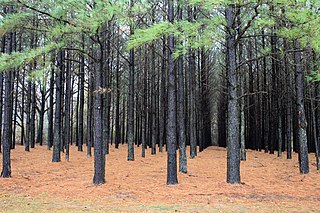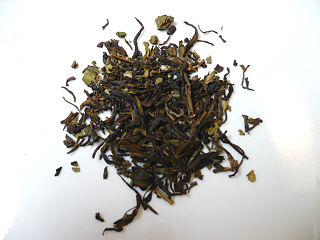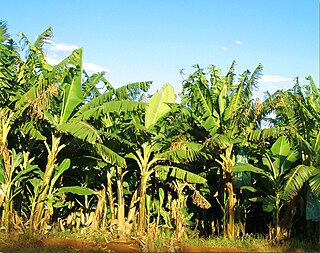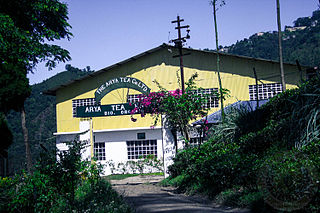
A plantation is the large-scale estate meant for farming that specializes in cash crops. The crops that are grown include cotton, coffee, tea, cocoa, sugar cane, sisal, oil seeds, oil palms, fruits, rubber trees, and forest trees. Protectionist policies and natural comparative advantage have sometimes contributed to determining where plantations are located.

Nilgiri tea is generally described as being a dark, intensely aromatic, fragrant and flavoured tea grown in the southern portion of the Western Ghats mountains of the Indian subcontinent. It is grown in the hills of the Nilgiris district of Tamil Nadu, though there are numerous other tea-growing districts in South India as well, including Munnar and Central Travancore, further south in Kerala state.

The Rainforest Alliance is an international non-governmental organization (NGO) based in New York City and Amsterdam, with offices throughout the world, it operates in more than 60 countries. It was founded in 1987 by Daniel Katz, who serves on its board of directors, and is currently led by CEO Han de Groot. Its main work is the provision of an environmental certification on sustainable forestry and agriculture and tourism. Its certificate seal gives information to consumers over about business practices, based on certain standards they set.

The history of coffee dates back to the 15th century, and possibly earlier with a number of reports and legends surrounding its first use. The native (undomesticated) origin of Coffee bean is thought to have been Ethiopia. The earliest substantiated evidence of either coffee drinking or knowledge of the coffee tree is from the early 15th century, in the Sufi monasteries of Yemen, spreading soon to Mecca and Cairo. By the 16th century, it had reached the rest of the Middle East, South India (Karnataka), Persia, Turkey, the Horn of Africa, and northern Africa. Coffee then spread to the Balkans, Italy, and to the rest of Europe, as well as Southeast Asia and then to America, despite bans imposed during the 15th century by religious leaders in Mecca and Cairo, and later by the Catholic Church.

Organic cotton is generally defined as cotton that is grown organically in subtropical countries such as India, Turkey, China, and parts of the USA from non-genetically modified plants, and without the use of any synthetic agricultural chemicals such as fertilizers or pesticides aside from the ones allowed by the certified organic labeling. Its production is supposed to promote and enhance biodiversity and biological cycles. In the United States, cotton plantations must also meet the requirements enforced by the National Organic Program (NOP) from the USDA in order to be considered organic. This institution determines the allowed practices for pest control, growing, fertilizing, and handling of organic crops.

Organic farming is practiced around the globe, but the markets for sale are strongest in North America and Europe, while the greatest dedicated area is accounted for by Australia, the greatest number of producers are in India, and the Falkland Islands record the highest share of agricultural land dedicated to organic production.

Indonesia was the fourth-largest producer of coffee in the world in 2014. Coffee cultivation in Indonesia began in the late 1600s and early 1700s, in the early Dutch colonial period, and has played an important part in the growth of the country. Indonesia is geographically and climatologically well-suited for coffee plantations, near the equator and with numerous interior mountainous regions on its main islands, creating well-suited microclimates for the growth and production of coffee.

A banana plantation is a commercial agricultural facility found in tropical climates where bananas are grown.
Frontier Co-op is a cooperatively owned wholesaler of natural and organic products, founded in 1976 and based in Norway, Iowa. It sells products under the Frontier Co-op, Simply Organic and Aura Cacia brands. Products include culinary herbs, spices and baking flavors; bulk herbs and spices; and natural and organic aromatherapy products. Frontier Co-op manufactures and distributes products throughout the United States and Canada.

Arya Tea Estate in the Darjeeling district of West Bengal, India is a manufacturer of specialty teas for international sale, as part of the Indian holding company Eurasia Group. The estate sits at an average altitude of 1500 metres and covers 125 hectares, with just over 300 acres (1.2 km2) under tea plantation.

The Temi Tea Garden in Temi, established in 1969 by the Government of Sikkim, is located in South Sikkim in the northeastern Indian state of Sikkim. It is the only tea garden in Sikkim and considered one of the best in India and in the world. Top quality tea is produced, which is in demand in the international market. The garden is laid over a gradually sloping hill. The tea produced in this garden is also partly marketed under the trade name "Temi Tea".
Pussimbing is a tea estate in West Bengal, India. It is located about 6 kilometres (3.7 mi) from the Ghum railway station in the Darjeeling Himalayan hill region.
The FairWild Foundation aims to provide a global framework for implementing a sustainable and fair trading system for wild-collected plant ingredients and their products. It was established in 2008 in response to the major ecological and social challenges created by the ever-increasing demand for wild plant ingredients for use in food, cosmetics, well-being and medicinal products. Unsustainable harvesting of potentially vulnerable plant species can endanger local ecosystems as well as the livelihoods of the collectors who often belong to the poorest social groups in the countries of origin.

Bangladesh is an important tea-producing country. It is the 10th largest tea producer in the world. Its tea industry dates back to British rule, when the East India Company initiated the tea trade in the hills of the Sylhet region. In addition to that, tea cultivation was introduced to Greater Chittagong in 1840. Today, the country has 166 commercial tea estates, including many of the world's largest working plantations. The industry accounts for 3% of global tea production, and employs more than 4 million people.

Peru is one of the top 20 coffee producers in the world as of 2014. It ranks fifth in the export of Arabica in the world market.

Tea production is one of the main sources of foreign exchange for Sri Lanka, and accounts for 2% of GDP, contributing over US $1.5 billion in 2013 to the economy of Sri Lanka. It employs, directly or indirectly, over 1 million people, and in 1995 directly employed 215,338 on tea plantations and estates. In addition, tea planting by smallholders is the source of employment for thousands whilst it is also the main form of livelihoods for tens of thousands of families. Sri Lanka is the world's fourth-largest producer of tea. In 1995, it was the world's leading exporter of tea, with 23% of the total world export, but it has since been surpassed by Kenya. The highest production of 340 million kg was recorded in 2013, while the production in 2014 was slightly reduced to 338 million kg.

Sisal production in Tanzania began in the late 19th century by the German East Africa Company. Sisal was continually produced during the German administration and the British administration and was the colony's largest export highly prized for use in cordage and carpets worldwide. At the time of independence in 1961, Tanzania was the largest exporter of Sisal in the world and the industry employed over 1 million farmers and factory workers.
The Fair Rubber Association, Fair Rubber e.V., is a non-governmental organization registered under German law. Its purpose is to apply the principles of fair trade to products made of natural rubber, in order to help improve the working and living conditions in particular of the primary producers of natural rubber, i.e. the tappers and small farmers involved in the procurement of raw latex milk.

Ambootia or Ambootay is a Tea Estate just below Kurseong in the foothills of the Himalayan Mountains in Darjeeling district in the state of West Bengal in India. Nepali is the main language spoken by the local population.














